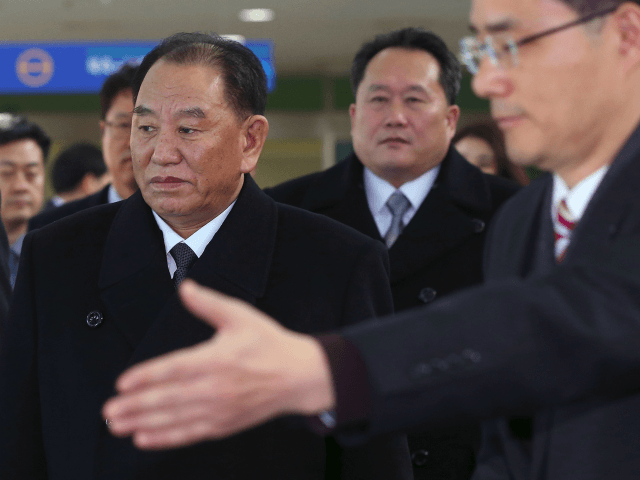Senior North Korean official Kim Yong-chol, the second-in-command in the ruling communist Workers’ Party, reportedly landed in Washington, D.C., Thursday for talks with Secretary of State Mike Pompeo. Several reports suggest Kim may meet with President Donald Trump and may be carrying a letter from dictator Kim Jong-un.
Sanctions ban Kim Yong-chol, along with most of North Korea’s senior leadership, from entering the United States. Yet he has made several visits to the country for fine dining events with the State Department and meetings with senior American officials. Most recently, he brought Trump a letter from Kim Jong-un to the White House in June, prior to the first summit between the president and the tyrannical cult leader.
South Korea’s JoongAng Ilbo reported Friday that Kim Yong-chol is expected to discuss the logistics of securing a second summit between Kim Jong-un and Trump early this year. He is scheduled to stay in the United States for three days.
Photos of Kim meeting with Pompeo began surfacing on social media late Friday morning:
Secretary Pompeo, Special Rep. Steve Biegun, and Kim Yong Chol entered a gray carpeted room in the Dupont Circle Hotel and stood there quietly before entering a meeting room. They stood in front of a crimson wall with a book shelf with plants and a photo of Martin Luther King Jr. pic.twitter.com/rRpHjPctYn
— John Hudson (@John_Hudson) January 18, 2019
“Kim was expected to have talks with U.S. Secretary of State Mike Pompeo and pay a courtesy call to U.S. President Donald Trump at the White House Friday, bearing a personal letter from North Korean leader Kim Jong-un,” JoongAng Ilbo claimed, citing unnamed “diplomatic sources.”
Pompeo had previously scheduled talks with Kim in November, though both sides canceled that meeting.
Yonhap, another South Korean outlet, also reported that Kim landed in Washington on Thursday and witnesses had spotted him about town. Kim reportedly flew directly into Washington, D.C., an unprecedented move for a North Korean official. The stop suggests the government has once again offered him a sanctions waiver in the interest of continuing nuclear weapons talks. Yonhap calls it “likely” that Kim will meet with Trump, as well.
Most reports agree that the top issue for discussion is a meeting between the two heads of state, which Trump suggested late last year would occur early this year. A report in the Washington Post this week suggested that diplomats had already agreed on a location for the summit – the beachside resort city of Danang, Vietnam – but not on the date, though the event would most likely take place in March or April. Prior reports had suggested that the two sides preferred Hanoi, the Vietnamese capital, for a meeting, though the Vietnamese government is eager to bring attention to Danang for tourism purposes.
Prior to Kim Yong-chol’s visit, reports surfaced this week that another senior North Korean official, intelligence chief Suh Hoon, traveled to Washington as recently as last week to meet with his American counterpart, CIA Director Gina Haspel, with a similar issue docket to Kim’s: the planned Trump-Kim summit. American officials did not confirm those reports, however, which primarily surfaced in South Korean media.
The South Korean government, led by leftist President Moon Jae-in, has been keenly watching relations between North Korea and the United States. Moon has made clear he wishes to see an end to the Korean War – technically still in effect despite no hostilities between warring parties since 1953 – and has urged the United States to push for an end to the sanctions currently preventing North Korean from legally participating in much of the international market. The Trump administration has refused to ease sanctions because North Korea has taken no steps to dismantle its illegal nuclear weapons program, which prompted the sanctions.
The South Korean Unification Ministry weighed in on a potential second summit on Friday. A spokesman stated, “Since the two leaders [Trump and Kim] promised to work for the complete denuclearization of the Korean Peninsula last June, we hope their agreement will be materialized at an early date.”
During the last summit, the two leaders signed a declaration agreeing that they wished to see the “denuclearization of the Korean Peninsula.” While Washington defines this as an end to the North Korean nuclear program, Pyongyang claims that this requires a total absence of U.S. troops in Korea, impossible so long as the Korean War technically continues.
Experts speaking at an event hosted by the conservative South Korean newspaper Chosun Ilbo this week suggested that a second round of talks between Trump and Kim may result in some concessions to Pyongyang to ensure that Kim continues engaging in talks, even though his officials have plenty of incentive to do so in the form of expensive food and lodging in some of the world’s biggest capitals.
“Washington’s ‘Plan A’ — engaging directly with the North Korean leader to convince him to denuclearize — has failed,” Evans Revere of the Brookings Institution reportedly suggested. “It is now time to think about ‘Plan B’ … what several U.S. administrations have vowed never to allow: a permanently nuclear-armed North Korea.”

COMMENTS
Please let us know if you're having issues with commenting.